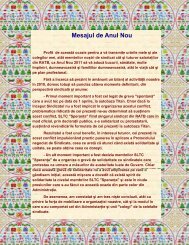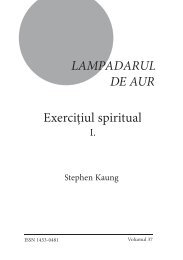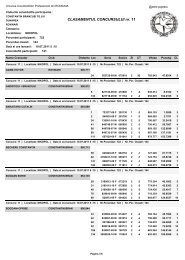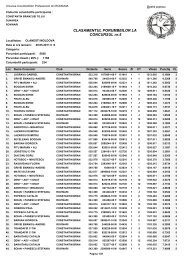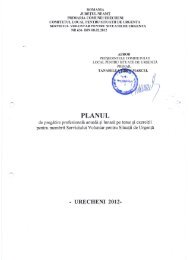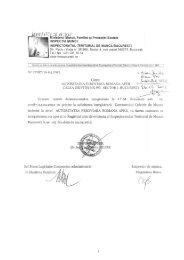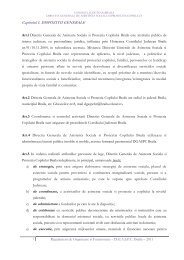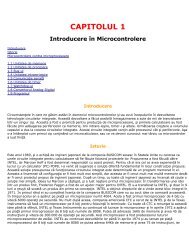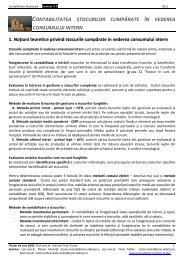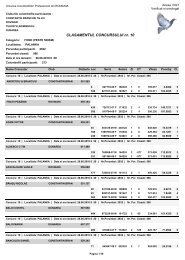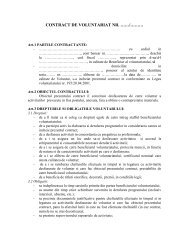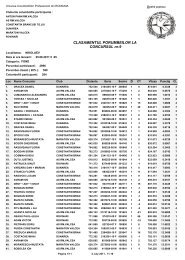Create successful ePaper yourself
Turn your PDF publications into a flip-book with our unique Google optimized e-Paper software.
Quest<br />
BULGARIA<br />
Quest<br />
The Art of<br />
Bulgarian Cuisine<br />
16 Traditional Bulgarian Recipes<br />
www.questbulgaria.com
Quest The<br />
BULGARIA<br />
Tarator <br />
Yoghurt with<br />
cucumber and walnuts Page 4<br />
Roasted Tomato Soup <br />
Makes the most of the organic<br />
Bulgarian produce Page 5<br />
Shopska Salad <br />
The most popular<br />
salad in Bulgaria Page 6<br />
Mish-Mash <br />
Traditional and delicious<br />
kind of omelette Page 7<br />
Pulneni tchushki <br />
Peppers stuffed with<br />
minced beef and rice Page 8<br />
Kufteta <br />
Spicy meatballs - perfect<br />
for the Barbecue! Page 9<br />
Moussaka <br />
Bulgarian aubergine<br />
moussaka - delicious! Page 10<br />
Zrial Fassoul <br />
Cheap, delicious haricot<br />
beans with vegetables Page 12<br />
Art of<br />
Bulgarian Cuisine<br />
Kavarma <br />
Oven-baked pork in<br />
earthenware bowl Page 13<br />
Panagurishte eggs <br />
Delicous poached eggs with<br />
garlic and yoghurt Page 14<br />
Koledna Pitka <br />
Traditional bread made at<br />
home Christmas Eve Page 15<br />
Baklava <br />
Very sweet dessert,<br />
perfect with an Espresso Page 16<br />
Pumpkin Soup <br />
Delicious Tomato,<br />
and Pumpkin soup Page 17<br />
Rhodopian Klin <br />
Warming and filling<br />
winter staple dish Page 18<br />
Sarmi <br />
Cabbage leaves stuffed<br />
with mince and rice Page 19<br />
Medenki <br />
Biscuits for the<br />
festive season Page 20<br />
www.questbulgaria.com +359 2 851 9065<br />
Sales & Marketing Director: Jain Goodall info@questbg.com ■ Managing Director: Chris Goodall chris@questbg.com<br />
Office Manager: Georgi Vergov georgi@questbg.com ■ UK Representative: Ken Reed ken@questbg.com - 01945 467463
Many centuries of tradition have gone into what is now considered<br />
'Bulgarian' cuisine - there are many influences from throughout this<br />
time, in particular the neighbouring countries of Greece and Turkey.<br />
Many of the ingredients produced in Bulgaria are world famous - the<br />
herbs grown here are exported all around the world, Bulgarian yoghurt<br />
(kiselo mljako) is considered by many to be the best in the world (indeed<br />
some 200,000 tons of Bulgarian yoghurt are sold in Japan every year!)<br />
and the organic fruit and vegetables are legendary ... many of our<br />
subscribers write to us with tales of how ‘the fruit tastes like it did when I<br />
was a child’, and this is perfectly true ... no pestisides here ... everything<br />
grown naturally and one can certainly taste the difference.<br />
Whilst there are some delicous meat dishes in Bulgaria, many of the dishes<br />
are ‘meatless’ - in fact the Bulgarians eat only half the amount of meat as<br />
people in other EU countries, which is partly down to their Orthodox<br />
beliefs where many celebrations require a fasting from meat - in this<br />
respect, the country is a perfect place for vegetarians to visit ... the salads<br />
and fruits are wonderful and everyone should try to experience the open<br />
air fruit and vegetable markets on a visit here.<br />
Every month in Quest Bulgaria Magazine we feature a Bulgarian recipe,<br />
always trying to make the most of the organic vegetables. Most recipes<br />
are ‘traditional’ however, as it’s me personally who cooks these dishes<br />
every month whilst photographing them for the magazine, they have all<br />
been slightly ‘personalised’ to suit my own and Jain’s tastes!<br />
Here we have selected a few recipes from recent issues which include,<br />
soups, salads, main dishes (both vegetarian and with meat) and<br />
desserts. We do hope you try some of them out ... and enjoy the results!<br />
Chris Goodall, Managing Director, Quest Bulgaria Magazine<br />
introduction<br />
BULGARIAN CUISINE<br />
DID YOU KNOW ... BULGARIAN HERBS<br />
are known worldwide. Bulgaria is the fourth largest<br />
producer of medicinal herbs in the world, exporting a<br />
total of 12,000 tons per year, most of it to the European<br />
Union and the United States.<br />
Around 350,000 people are employed in the herb<br />
industry in Bulgaria.<br />
3,000 different types of plants grow on the mountains<br />
of Bulgaria. Over 300 of these plants are used in the<br />
pharmaceuticals industry, while 750 types are used in<br />
alternative medicine. Some of the most popular herbs<br />
are lavender, mint, thyme, chamomile, wild marjoram<br />
and St. John’s wort.<br />
All copyright in this publication vests in Peluche OOD, Sofia, Bulgaria. No copying, storing, scanning, other reproduction or transmission<br />
of any part of this publication is permitted without the express written permission of Peluche OOD. Failing such permission, Peluche OOD<br />
is entitled to pursue legal prosecution.<br />
All the information in this publication is believed to be correct at the time of publishing and no responsibility for any loss occasioned to any<br />
person acting or refraining from acting as a result of any information in this publication can be accepted by Peluche OOD.<br />
Peluche OOD is registered under company case No. 6610/2004 of the Sofia City Court, with Tax. No. 2221191032
A very simple and traditional Bulgarian dish ...<br />
perfect for cooling down during the warmer days!<br />
RECIPE OF THE MONTH<br />
cooling tarator<br />
Serves 4-6 :<br />
Ingredients :<br />
1 litre yoghurt (Bulgarian if possible)<br />
2 cucumbers<br />
Walnuts, about 10<br />
1 cup sunflower oil<br />
Fresh Fennel<br />
Garlic (if you are not going out for the afternoon!)<br />
Instructions :<br />
Finely chop the walnuts and fennel (and garlic)<br />
Grate the cucumbers (or dice if you prefer)<br />
Combine all the ingredients, mix and serve<br />
That’s it... enjoy!<br />
Tarator can be served as a starter (if so, you can add a cupful<br />
of water before serving), or makes a fabulous vegetarian<br />
main meal.<br />
QBG
This month, Quest Bulgaria subscriber David Barker and<br />
family share with us their recipe for Roasted Tomato Soup,<br />
which makes perfect use of organic Bulgarian vegetables<br />
(see article on previous page).<br />
Ingredients:<br />
Serves 4<br />
1 kilo of ripe tomatoes cut into quarters<br />
250g red onions cut into wedges<br />
4 garlic cloves<br />
3 fresh rosemary sprigs<br />
2 large red peppers quartered and de-seeded<br />
4 tablespoons olive oil<br />
300 ml of heated vegetable stock<br />
1 tablespoon red wine vinegar<br />
4 dashes Worcestershire sauce (optional)<br />
A few sprigs of parsley<br />
1 dash of Tabasco sauce (optional)<br />
Instructions:<br />
Pre-heat the oven to 220 degrees centigrade.<br />
Place the tomatoes, onions, garlic,<br />
rosemary & peppers into a large<br />
roasting tin.<br />
Drizzle with olive oil and roast<br />
for 45 minutes until tender and<br />
beginning to char.<br />
Remove from the oven and<br />
blend briefly so that the<br />
mixture is still a bit chunky.<br />
Tip into a large pan and<br />
add the stock, vinegar,<br />
Worcestershire sauce<br />
and Tabasco sauce.<br />
Heat gently through and<br />
serve with parsley sprigs<br />
and chunky bread.<br />
QBG<br />
RECIPE OF THE MONTH<br />
roasted<br />
TOMATO SOUP
RECIPE OF THE MONTH<br />
shopska salad<br />
As soon as the winter months have faded and we start to enjoy the warmer months of summer,<br />
one can’t help thinking of the fabulous Bulgarian salads - with all that wonderful fresh produce<br />
Shopska salad (shopska salata) is one the the most popular<br />
salads in Bulgaria and also my mother’s personal favourite<br />
during my parents’ many visits here to Bulgaria.<br />
Here is my own version!<br />
Serves 4<br />
Ingredients:<br />
4 spring onions<br />
4 medium size tomatoes<br />
half a cucumber<br />
2 green peppers<br />
100g of bulgarian ‘cerene’ white cheese (or feta)<br />
chopped fresh parsley<br />
olive oil<br />
salt<br />
optional: olives<br />
Instructions:<br />
Grill the peppers until the skin starts to darken and crisp. Let<br />
cool, covered, for a few minutes. Then remove the skins and<br />
the pips.<br />
Tip: here in Bulgaria, rather than heating the grill, the<br />
peppers are often browned on an electric hot plate.<br />
Cut them into small cubes, along with the onions, tomatoes<br />
and cucumbers.<br />
Place the prepared ingredients into a large salad bowl.<br />
Season, add chopped parsley, olive oil and mix<br />
well.<br />
Cover in grated white cheese and enjoy!<br />
If it takes your fancy, throw on a few<br />
black olives.<br />
Whilst most Bulgarians would<br />
normally accompany this with a<br />
traditional glass of rakia -<br />
I prefer a glass of chilled<br />
Bulgarian Chardonnay -<br />
Perfect!<br />
Chris QBG
RECIPE OF THE MONTH<br />
mish-mash<br />
Mish-Mash is the traditional type of Bulgarian<br />
Omelette ... a perfect dish for using up all<br />
those leftovers in the fridge!<br />
Ingredients: (serves 4)<br />
8 eggs<br />
1 onion<br />
2 cloves garlic<br />
2 green peppers<br />
2 medium tomatoes<br />
200 gr. of sirene (or feta) cheese,crumbled<br />
50g butter<br />
Vegetable oil,<br />
Chopped fresh parsley (third of a cup)<br />
Paprika<br />
Salt and freshly milled black pepper<br />
Instructions:<br />
Cut the onions into rounds, finely chop the peppers,<br />
parsley and garlic. Peal the tomatoes and dice.<br />
In a bowl, beat the eggs and add to the mixture the<br />
crumbled cheese.<br />
Melt the butter in a frying pan, add a splash of oil and<br />
cook the onions and garlic for a few<br />
minutes.<br />
Keep stirring and add the<br />
peppers. Cook again for<br />
another 2 or 3 minutes. Add<br />
the tomatoes and reduce the<br />
liquid for a good 10 minutes.<br />
Season with salt and pepper,<br />
and add a good sprinkle of<br />
paprika.<br />
Pour over the eggs/cheese<br />
mixture and cook for another 3 or<br />
so minutes, stirring very<br />
gently.<br />
Sprinkle with parsley and<br />
serve immediately.<br />
Perfect with toasted crusty<br />
bread! QBG
RECIPE OF THE MONTH<br />
pulneni tchushki<br />
STUFFED RED PEPPERS<br />
Ingredients:<br />
(Serves 4)<br />
8 medium-sized dry red peppers<br />
1 onion<br />
200 g of dry beans<br />
choubritza (if unavailable you can use Herbes de Provence)<br />
salt<br />
oil<br />
flour<br />
Instructions:<br />
Soak the dry red peppers in hot water to give them some texture<br />
and help them loosen up (if you don’t have dry ones, use fresh<br />
ones - in this case do not soak them in hot water)<br />
Cook the beans in water with no salt in it until they are soft when<br />
pressed with a fork<br />
Fry the chopped onion in a pan, add to the beans - add salt, oil,<br />
choubritza and simmer until the most of the water has<br />
evaporated<br />
Fill the peppers with the beans, dip the peppers in flour with the<br />
open side down, so the contents won’t spill<br />
Preheat the oven to 220˚C<br />
Lay the stuffed peppers on a tin<br />
Originally some sauerkraut juice was poured into the tin, to<br />
keep the dish moist and give it more flavour - if you are not<br />
fond of that, just add water and oil and bake until the peppers<br />
are nice and brown<br />
Serve<br />
Svetoslava Slavova<br />
The last day of Christmas Lent is<br />
Christmas Eve and therefore all meals<br />
are vegetarian. This month, we share<br />
with you two traditional vegetarian<br />
recipes ... here we have stuffed red<br />
peppers and on page 47 ‘medenki’,<br />
traditional biscuits.<br />
If you have Bulgarian friends or<br />
neighbours for Christmas Eve, then<br />
you can’t go wrong serving these two<br />
dishes.<br />
Dobar apetit!<br />
Stuffed Red Peppers are a traditional dish<br />
from the Pleven region, but to me - a<br />
native of the Dobrudja region - this is an<br />
unusual and interesting way to serve<br />
beans.<br />
For the stuffing use the dry white/ red<br />
beans you see on sale at the supermarkets.<br />
I would not use the big beans from the<br />
Rhodopi region - as they are too big to fit<br />
in a small pepper.<br />
Remember, when you boil the beans<br />
beforehand, do not use any salt - or they’ll<br />
never boil. Once they’ve started boiling,<br />
take the pan off the hot plate, pour the<br />
water out and replace with fresh water.<br />
After you’ve made sure the beans are nice<br />
and soft, you can add the seasoning -<br />
choubritza or mint (jojen) is good for<br />
cooked beans.
Ingredients:<br />
1kg minced meat - 60% pork, 40% beef<br />
100g onions (1 or 2)<br />
1/2 teaspoon ground cumin<br />
1/2 teaspoon black pepper<br />
20g salt<br />
Instructions:<br />
Salt the minced meat and place in the fridge for around 4 hours.<br />
Then, mix it with the black pepper and cumin. Thinly slice the<br />
onions and mix into the mixture along with 2 or 3 teaspoons of<br />
water. Mix all the ingredients well and let rest again in the<br />
fridge for 2 hours.<br />
Form into meatball or burger shapes and either fry them or<br />
barbecue them ... serve with salad or vegetables of your choice<br />
and, of course, don’t forget the cold glass of Bulgarian beer!<br />
RECIPE OF THE MONTH<br />
kufteta<br />
Kufteta is a traditional Bulgarian dish<br />
which is served all year round -<br />
similar in taste to a savoury meatball<br />
or a homemade burger ... perfect for<br />
those outdoor barbecues particularly<br />
if served with a few well chilled<br />
Bulgarian beers!<br />
Alternatively, you could make the most<br />
of the wonderful Bulgarian organic<br />
vegetables and create a vegetarian<br />
version of the same dish ...<br />
Ingredients:<br />
800gr courgettes (3-4)<br />
500gr boiled potatoes (5-6)<br />
3 eggs<br />
Half a sprig of parsley finely chopped<br />
90 gr flour (1/2 a cup)<br />
1 cup sunflower oil<br />
black pepper and salt<br />
Yoghurt to garnish<br />
Instructions:<br />
Peel the boiled potatoes and mash them.<br />
Grate the raw courgettes and add to the<br />
potatoes. Mix together with two of the<br />
eggs, parsley, black pepper and the salt.<br />
Form into balls or burgers, brush with the<br />
last beaten egg and dip in some flour.<br />
Pan fry or barbecue them and serve with<br />
the yoghurt.<br />
QBG
RECIPE OF THE MONTH<br />
moussaka<br />
OF AUBERGINE<br />
Bulgarian Moussaka, is quite similar to its ‘greek’<br />
counterpart and generally comes in 3 varieties:<br />
aubergine, courgette or the more well-known potato<br />
Feel free to substitute the aubergine for slices of potato<br />
or courgette to try the other versions of this recipe.<br />
Ingredients: (Serves 6)<br />
500g of minced beef<br />
4 large, firm aubergines<br />
2 onions<br />
4 cloves of garlic<br />
4 tomatoes<br />
1 small tin of tomato puree<br />
100g of grated hard cheese<br />
1 teaspoon of chopped fresh parsley<br />
Half teaspoon of chilli powder<br />
Flower<br />
Sunflower oil<br />
Water<br />
Salt and freshly milled black pepper<br />
Instructions:<br />
Without peeling the aubergines, cut them into thin<br />
slices. Spread them out and sprinkle them with salt,<br />
leave until the water has come out, then turn over<br />
and do the same.<br />
Coarsely chop the onions and finely chop the<br />
garlic. Blanch, peel and chop the tomatoes,<br />
grate the cheese and finely chop the parsley.<br />
Heat 2 tablespoons of oil in a frying pan and<br />
gently fry the onion for around 5 minutes,<br />
adding the garlic for the last minute or so.<br />
Add the minced beef, and keep frying,<br />
whilst stirring for another 5 minutes.<br />
Add to this mixture the tomatoes,<br />
spices, tomato puree and let cook for a<br />
further 10 minutes whilst stirring<br />
frequently.<br />
Dry the aubergines, then dip each side<br />
into flower. Heat another 2 tablespoons of<br />
oil in a frying pan and cook the aubergines<br />
for around 5 minutes each side until a lovely,
golden brown. Once cooked, drain the aubergines and if<br />
necessary, remove excess oil with absorbent paper.<br />
RECIPE OF THE MONTH - MOUSSAKA<br />
Heat the oven to 180°c. In a large oven proof dish, place alternate<br />
layers of aubergines, mince, finally finishing with a layer<br />
of aubergines.<br />
Sprinkle with grated cheese and cook in the oven for around<br />
20 minutes. Enjoy!<br />
Another option is to mix the<br />
grated cheese into a litre of<br />
natural yoghurt (Bulgarian if<br />
possible) and pour this on the<br />
mixture before cooking ...<br />
delicious!<br />
SUBSCRIBE TO THE PRINTED EDITION SUBSCRIBE TO THE ONLINE EDITION<br />
and get Quest Bulgaria magazine delivered<br />
direct to your door<br />
12 times per year<br />
and get Quest Bulgaria magazine online<br />
for only £35 or 50 euros<br />
12 times per year<br />
(UK/mainland Europe)<br />
£12 or 18 euros Bulgaria £50 or 74 euros Rest of the World for only £12.99 for the whole year<br />
(includes post and packaging)<br />
Plus get access to a searchable archive of<br />
Plus get access to our online ‘Ask an Expert’<br />
back issues<br />
and a range of special discounts<br />
for information: www.questbulgaria.com or info@questbg.com or 01945 467463 (UK)
This recipe is traditional Bulgarian, and not only<br />
makes best use of the fabulous organic<br />
vegetables here, but is incredibly cheap to<br />
prepare. Also perfect for our vegetarian readers.<br />
Ingredients:<br />
Serves 4<br />
350g dried haricot beans<br />
2 medium onions<br />
1 carrot<br />
1 stick of celery<br />
2 tomatoes<br />
1 soup spoon of tomato purée<br />
4 soup spoons of oil<br />
1 coffee spoon of paprika<br />
half a coffee spoon of chilli powder<br />
2 soup spoons of chopped fresh mint<br />
2 soup spoons of chopped fresh parsley<br />
Instructions:<br />
Soak the beans in water for at least 24 hours and drain well<br />
before preparation.<br />
Chop the onion and dice the carrots and celery. Blanche the<br />
tomatoes then peel and chop.<br />
Place the beans in a large pan and cover with cold water.<br />
Bring to the boil and cook for 3 to 5 minutes. Remove from the<br />
heat and drain. Place the drained beans back in the pan and<br />
cover again in clean boiling water and a soup spoon of oil.<br />
Reduce the heat, cover and cook until the beans are cooked,<br />
but still firm (up to 2 hours).<br />
Add the carrots, celery and mint. Heat the<br />
remaining oil in a pan and gently fry the<br />
onion for 3-4 minutes. Add the<br />
paprika, chilli,tomatoes and tomato<br />
purée.<br />
Gently cook for a few minutes<br />
more then add to the beans.<br />
Cook a further 5 minutes.<br />
Season with salt and ground<br />
black pepper if necessary<br />
and sprinkle with chopped<br />
parsley - can be served hot or<br />
cold - priaten apetit! QBG<br />
RECIPE OF THE MONTH<br />
zrial fassoul<br />
DRIED HARICOT BEANS
RECIPE OF THE MONTH<br />
kavarma<br />
There are many recipes for the Bulgarian dish Kavarma - this is a traditional one using Pork,<br />
although the dish also exists in Beef and Chicken versions ... perfect for a cold winter evening!<br />
Ingredients:<br />
Serves 4<br />
800 g pork (fillet is best)<br />
5 red peppers (the 'flat' Bulgarian ones)<br />
4-5 onions (the larger and softer the better)<br />
1-2 tomatoes<br />
1 cupful button mushrooms<br />
1 small green chilli (if you prefer your dishes spicy)<br />
1/3 cupful white wine<br />
Chubritza (a Bulgarian herb - it is possible to replace with<br />
‘Herbes de Provence’ but not the same taste!)<br />
sprinkle of paprika<br />
parsley (fresh and finely chopped)<br />
half a cupful of lard or sunflower oil<br />
salt and pepper<br />
Instructions:<br />
Cut the meat into small pieces and brown in the lard or oil.<br />
Add the onions and continue to fry until the onions are<br />
tender.<br />
Add the sliced mushrooms, peppers, tomatoes, wine,<br />
pepper, salt, paprika (optional chilli), chubritza and a splash<br />
of warm water.<br />
Kavarma should be baked in the oven<br />
in traditional earthenware bowls -<br />
(guvech - see below) these bowls are<br />
available in most hardware shops in<br />
Bulgaria for around 3 leva for<br />
individual bowls and around 15 leva<br />
for a 4-6 servings bowl.<br />
Stir, pour into individual earthenware<br />
bowls (or a large earthenware bowl) and<br />
bake for one and a half hours at 180°c<br />
Serve with finely chopped parsley<br />
and large pieces of crusty bread.<br />
Enjoy!<br />
Plus, leaving out the pork makes<br />
for a delicious vegetarian meal.<br />
QBG
The town after which this dish is named is Panagurishte<br />
(pronounced pan-a-gyoor-ish-te), and if you wanted to<br />
order this dish in a restaurant or bar then you would ask for<br />
‘yaitsa po panagyuski’, but to be honest, it could possibly<br />
take longer to learn the correct pronunciation as it would to<br />
prepare the actual dish!<br />
Ingredients:<br />
Serves 4<br />
8 eggs<br />
4 soup spoons of butter<br />
600 g of natural yoghurt (Bulgarian if possible!)<br />
5 or 6 cloves of garlic<br />
5 soup spoons of vinegar<br />
2 teaspoons of paprika<br />
One third of a teaspoon of chilli powder<br />
Freshly chopped dill<br />
Salt<br />
RECIPE OF THE MONTH<br />
panagurishte<br />
Instructions:<br />
Crush the garlic and mix this together with the<br />
yoghurt and half a coffee cup of salt.<br />
Bring a full pan of water to the boil (with salt and<br />
the vinegar). Break the eggs one by one into a<br />
bowl, then poach them in the<br />
simmering water.<br />
After three minutes of cooking,<br />
remove the eggs. In a serving bowl,<br />
place the yoghurt and then the<br />
eggs on top.<br />
Heat the butter, add paprika and<br />
the chilli powder. Mix together for<br />
a few seconds and remove from the<br />
heat. Drizzle over the poached eggs.<br />
Sprinkle with freshly chopped dill<br />
and serve with a dry white wine<br />
and fresh crusty bread for a<br />
delicious and quick meal.<br />
Bon appetit!<br />
QBG<br />
POACHED EGGS
RECIPE OF THE MONTH<br />
koledna pitka<br />
CHRISTMAS BREAD<br />
Home-made breads are very traditional for<br />
the Christmas Eve celebrations in Bulgaria,<br />
often a silver coin will be hidden inside and<br />
the person who finds it will have good luck in<br />
the coming year.<br />
Ingredients:<br />
Half a cup of warm water<br />
1kg flour<br />
1 teaspoon vegetable oil<br />
2 eggs<br />
1 soup spoon of salt<br />
2 soup spoons of sugar<br />
1 cube of yeast<br />
Instructions:<br />
Dissolve the yeast in the warm water in a bowl. Add the<br />
sugar and 1 to 2 soup spoons of flour. The mixture should<br />
not become too thick.<br />
Put the rest of the ingredients in a bowl (except one egg<br />
yolk which should be kept aside for later), add the diluted<br />
yeast and knead into a dough.<br />
Separate the dough into 7 equal size balls.<br />
Take 6 of the 7 balls of dough and roll them into circles<br />
with a rolling pin. Cut each of the 6 circles of dough into 8<br />
triangular pieces (like a pizza).<br />
Place the 7th, uncut ball, into the centre of a greased<br />
baking tray.<br />
Brush the triangular cut pieces with oil. Take three slices,<br />
place them on top of each other and ‘twist’ to form cone<br />
shapes (see photograph). Repeat this process using 3 cut<br />
slices of dough until all the dough is used.<br />
Arrange the cones of dough, in a circular pattern around<br />
the centre ‘7th ball’ on the baking tray, in effect making a<br />
complete circle.<br />
Leave the dough in a warm place to rise.<br />
Brush the dough with the remaning egg yolk and bake for<br />
30 minutes in a preheated oven at 200 degrees. QBG
Ingredients:<br />
500g filo pastry sheets (available everywhere nowadays!)<br />
500g unsalted butter<br />
500g of finely chopped walnuts<br />
50g sugar<br />
5ml vanilla essence<br />
Half a cup of sugar<br />
1 cup of honey<br />
500ml water<br />
5ml lemon juice<br />
Teaspoon of cinnamon<br />
RECIPE OF THE MONTH<br />
baklava<br />
Instructions:<br />
Preheat the oven to 175 deg. C<br />
In a pan, boil the water and half a cup of sugar for 15 minutes. Add the lemon juice and honey boil for a further 10<br />
minutes. Set aside to cool.<br />
For the filling, combine the walnuts, 50g of sugar and vanilla essence. Mix well.<br />
Melt the butter in a saucepan and place two tablespoons in the bottom of a baking tray (I use 30cm x 20cm). Cut the filo<br />
to the size of the baking tray and place two sheets in the bottom, then again brush with melted butter.<br />
Now spread a couple of spoons of the walnut mixture on the filo sheets. Add two more filo sheets, and again brush with<br />
melted butter. Continue in this manner of filo, walnut, filo, walnut until the ingredients are used up.<br />
Cut the Baklava into individual portions before baking for around 1 hour until a lovely golden brown.<br />
Let cool on a wire rack for 5 minutes the pour over the honey and sugar mixture which should have cooled by now and<br />
sprinkle with icing sugar. Let stand for at least another two hours - if you can!<br />
QBG<br />
Baklava is a very sweet and delicious<br />
dessert - and goes perfect with a strong<br />
espresso coffee. Whilst this is a popular<br />
dessert here in Bulgaria, the origins are<br />
probably somewhat further south as<br />
the Greeks claim it as Greek and the<br />
Turks as Turkish! There are many<br />
variations of this recipe and this is my<br />
own version which seems just about<br />
right. This may not be the easiest to<br />
prepare recipe we have ever published<br />
but it is truly worth the effort ... enjoy!
Ingredients:<br />
Half a pumpkin (de-seeded and diced)<br />
2 large tomatoes, diced<br />
4 cloves garlic, crushed<br />
300 ml vegetable stock<br />
Fresh, chopped basil<br />
Olive oil<br />
Salt and milled black pepper<br />
RECIPE OF THE MONTH<br />
pumpkin soup<br />
Instructions:<br />
Heat 2 tbsp of olive oil in a large pan. Add the pumpkin and<br />
sauté for 5 minutes. Add the garlic and sauté for another 2<br />
minutes. Add the chopped tomatoes and continue to sauté for a<br />
further 5 minutes, season with salt and pepper.<br />
Pour in the stock, bring to the boil and simmer for 15 minutes.<br />
Blend the mixture and transfer to a serving dish.<br />
Stir in the cream, sprinkle with chopped basil and serve.<br />
Delicious!<br />
The Story behind this recipe:<br />
We recently met our good friend Diana<br />
St. John-Palmer for lunch and as usual we<br />
exchanged any ‘goodies’ we had spare.<br />
Diana kindly brought us a huge amount<br />
of fresh vegetables and salads from her<br />
garden which we exchanged for a recent<br />
english-language novel and a jar of<br />
Branston pickle (such exchanges are not<br />
uncommon here in Bulgaria!).<br />
The following day I had to decide what to<br />
do with the huge pumpkin that formed<br />
part of the parcel. I decide to make a<br />
soup ... the recipe is a fairly standard<br />
soup recipe but I was interested in using<br />
the pumpkin with the home-grown<br />
tomatoes and garlic.<br />
The result, I have to say, was fantastic ...<br />
even Jain had second and third helpings<br />
of soup! The following day I even made<br />
another batch with the remaining half of<br />
the pumpkin.<br />
I sent an e-mail of thanks to Diana and<br />
explained the recent ‘soup success’ chez<br />
nous. Diana replied and asked me for the<br />
recipe as she had a load of pumpkins<br />
growing in the garden but couldn’t get<br />
rid of them as all the neighbours also had<br />
lots growing in the garden.<br />
Diana tried the recipe and even served<br />
the soup to her Bulgarian friends ... every<br />
one of them also asked for the recipe ...<br />
so we thought, it must be good enough<br />
to publish here!<br />
Feel free to double up the quantities<br />
shown here, use up the whole pumpkin<br />
and make a whole load of soup as it can<br />
be frozen and reheated.<br />
So ... if you are unsure as to what to do<br />
with all those leftover pumpkins after the<br />
Halloween celebrations, why not try out<br />
this simple but tasty recipe?<br />
Enjoy!<br />
QBG
Ingredients:<br />
Pastry<br />
(either shop-bought filo, or make your own using flour, water, and a<br />
dessert spoonful of olive oil: knead and roll it out very thinly into a<br />
large circle)<br />
200g butter<br />
600g cooked rice<br />
4 eggs<br />
Salt (to taste)<br />
200g ‘sirene’ cheese. (feta or similar will do just as well)<br />
Nettles (dried or fresh) or spinach (optional)<br />
Instructions:<br />
Place the thin pastry casing (around 1mm thick) into a wide<br />
shallow pan that has been very generously buttered. The pastry<br />
should overlap the edges, preferably enough for you to use only<br />
one pastry sheet as the casing (but you can ‘patchwork’ it if<br />
necessary). The diameter of the pan must be no wider than the<br />
diameter of the hob heating it.<br />
Mix together the rice, crumbled cheese and eggs. Add salt (not<br />
too much as the white cheese is fairly salty already). You can<br />
make it plain, or add spinach as suggested, nettles (soak first for<br />
about a minute if using fresh, and make sure you are using<br />
young plants) or just about anything else you fancy. Place the<br />
filling into the pastry case and flatten it down. It should be<br />
between 1 and 2cm deep. Fold the pastry over to make it into a<br />
parcel.<br />
Cook on a low heat for around 20 minutes. From time to time,<br />
gently insert small pieces of butter between the sides of the dish<br />
and the pastry. Keep shaking the pan gently to ensure the pastry<br />
base is not sticking to the bottom. Carefully slide the klin onto a<br />
plate. Butter the pan again - generously. Place small butter<br />
knobs on the top of the klin too.<br />
Place the pan upside-down on top<br />
of the plate, and flip the whole<br />
thing over so that the klin lands in<br />
the pan, the other way up. Cook the<br />
other side. This normally takes<br />
another 20 minutes or so, when the<br />
pastry should look a beautiful<br />
golden colour.<br />
Alternatively you can cook klin in<br />
the oven, turning it over halfway<br />
through, as above.<br />
It really is as easy as that: simple<br />
but delicious!<br />
Eilidh Horder<br />
RECIPE OF THE MONTH<br />
klin<br />
Klin is a typical Rhodopean dish which is<br />
deliciously warming and a filling staple.<br />
Proof that the simple things in life are<br />
sometimes the best, klin is cheap to<br />
make, and can be eaten as a main supper<br />
dish or an accompaniment. It’s basically<br />
a type of rice pie, but don’t be put off -<br />
it tastes much better than it sounds!<br />
Klin is scrumptious served hot,<br />
especially when the cold weather sets in,<br />
with Bulgarian yoghurt served on the<br />
side - but it can also be eaten cold,<br />
during a summer barbecue or picnic, or<br />
as a snack. Different variations of the<br />
dish can be made using flavours<br />
according to your mood and the season.
RECIPE OF<br />
THE MONTH<br />
sarmi<br />
Bulgarian Sarmi are leaves of various kinds, stuffed with a mixture based on either meat or rice.<br />
Certain regions use lettuce or vine leaves and the most common variation is pickled cabbage leaves<br />
Ingredients:<br />
Serves 6<br />
1 kg pork mince<br />
1 whole cabbage<br />
1 large onion<br />
1 cup of rice<br />
Paprika<br />
Fresh parsley<br />
Chilli powder<br />
Oil<br />
Salt<br />
Pepper<br />
Instructions:<br />
Finely chop the onion and fry in a tablespoon of oil until<br />
softened. Stir in a teaspoon of paprika and remove from the<br />
heat.<br />
Stir in the meat, rice, a handful of finely chopped parsley and<br />
a pinch of chilli powder. Salt and pepper to taste.<br />
Unlike other countries that know and<br />
use ‘choucroute’ in Bulgaria the<br />
cabbage is pickled and preserved<br />
whole, rather than chopped ... this<br />
makes it perfect for creating both<br />
meat and vegetarian versions of<br />
‘sarmi’ at any time during the year.<br />
Cover with warm salted water and<br />
simmer until the water has been<br />
absorbed by the rice.<br />
Select around 40-50 large cabbage<br />
leaves and dip them in boiling, salted<br />
water for around a minute.<br />
Place one soup spoon of the pork and<br />
rice mixture in the centre of each leaf.<br />
Roll the leaf tightly and arrange them in<br />
a saucepan (see photograph).<br />
Pour over a cup and a half of warm water<br />
(or use the water that you dipped the<br />
cabbage leaves in earlier) and a drizzle<br />
of oil, cover and simmer on a low heat<br />
for two hours.<br />
Serve hot with vegetables of your choice<br />
and a glass of Mavrud ... delicious!<br />
QBG
Ingredients:<br />
750 g flour<br />
200 g sugar<br />
100 g honey<br />
One full teaspoon of bicarbonate of soda<br />
3 eggs<br />
50 g cooking oil,<br />
1 teaspoon of ground cloves<br />
1 teaspoon of cinnamon<br />
Pinch of salt<br />
Instructions:<br />
Sift the flour with the soda, salt, sugar, cinnamon and clover<br />
Beat the eggs with the honey and the oil<br />
Mix all into a dough<br />
Roll and cut it into shapes<br />
Bake in a greased tin - don’t forget to leave some space<br />
between the biscuits<br />
Bake in a moderately hot oven<br />
When cold, dip into some icing<br />
Enjoy!<br />
Svetoslava Slavova<br />
RECIPE OF THE MONTH<br />
medenki




